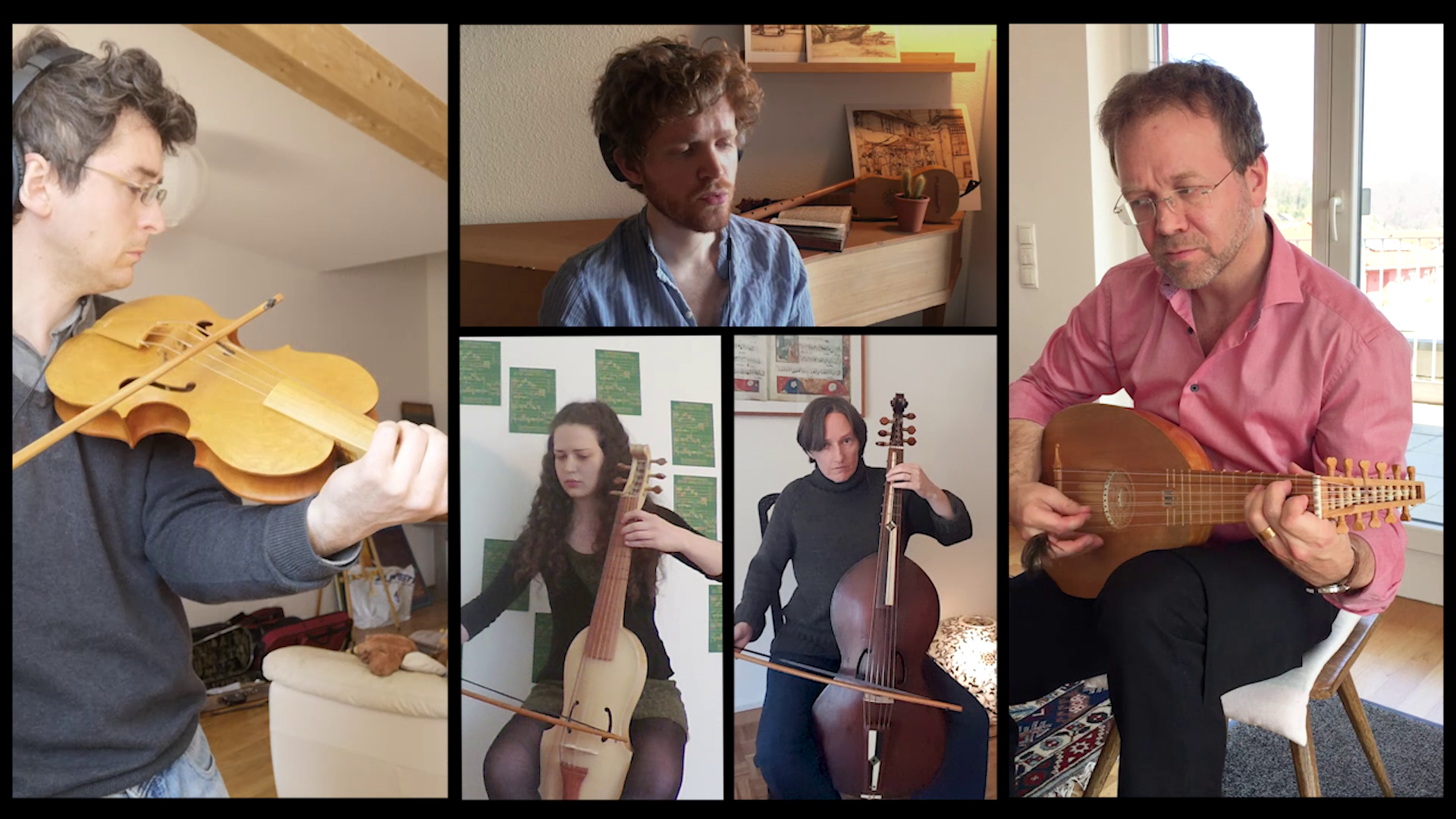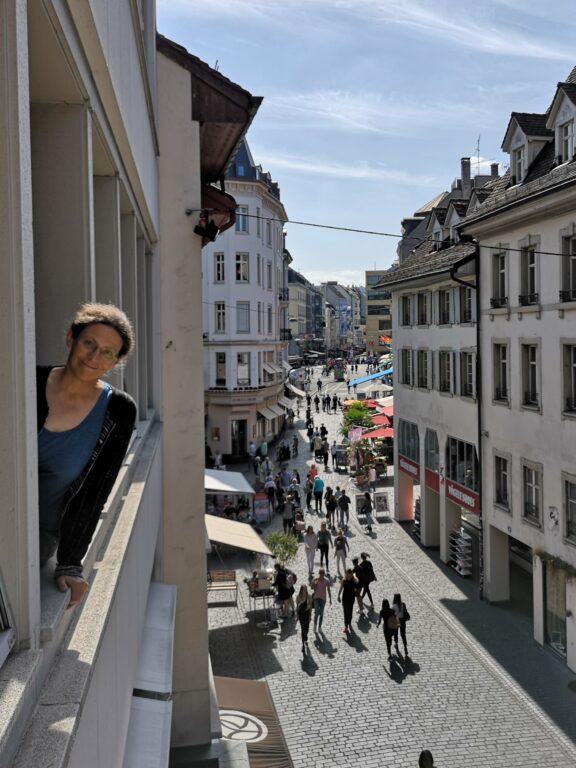
“Maria zart” is a movement by the otherwise unknown Pfabinschwantz, which we had planned to perform at the Barfüsserkirche on the occasion of the opening concert of the new ReRenaissance series – a meeting of musicians and listeners that seems unthinkably far away at this point. When we play this piece, we like to give a tongue-in-cheek account of the notion at the time that anyone who played or heard it was immune from the “French disease” (and received 40 days worth of purgatory indulgences to boot). Although none of us is superstitious enough to assume that a song could mysteriously save us from the recent pandemic, we think there is a shred of truth in the notion that music can invigorate the mental state and strengthen it against the unseen enemy.
“Maria zart”, in this setting by the otherwise unknown Pfabinschwantz, was in the program for the opening concert of the ReRenaissance series in Basel – a meeting of musicians and listeners which in this moment seems unthinkably far away. When we perform this piece we are happy to be able to tell our audience, with a wink, that anyone who plays or hears it will be immune to the “French illness”, and also receive an indulgence of 40 days from purgatory; such was the belief at the time it was written. Although none of us now is superstitious enough to think that listening to a song can mysteriously save us from the pandemic, there is a glimmer of truth in the idea that music can elevate the mind and strengthen it against the invisible enemy.
Jacob Lawrence – Tenor
Baptiste Romain – Clein violin
Tabea Schwartz – Great violin
Elizabeth Rumsey – Grand Violin
Marc Lewon – lute
Direction: grassroots
Video audio editing: Leonardo Bortolotto
IN TEMPORE PESTILENTIAE
Mary already, you wear the crown of angels as a prince. You step up and give us rest. The sinner thirsts for it, so that in distress he may follow his commandment and thus be delivered from the burden. So we ask you, now speak for us and report the request: Lord, protect us all from the great death. Your’ divine power may acquire the Confederation in adversity. (Marco Leoni – Note also the coronas/fermatas in the facsimile from his hand).
IN TIME OF PESTILENCE Beautiful Maria, You wear, like a prince, the crown granted you by the angels. Come near to us and give us Peace. May the sinner in his distress thirst to turn towards His guidance, and so be delivered from tribulation. Thus, we implore you, intercede for us now and present our plea: Lord, protect us all from the Great Death. May the Swiss Confederation in this time of affliction be granted your divine strength. (Marco Leoni)
The first three concerts in 2020 had to be postponed, so this counterfactual by Maria Zart was created, song lyrics with reference to the Corona.
Elisabeth Stähelin, initiator and administrative director of the association and the monthly concerts “ReRenaissance”, is interviewed by Dr. Thomas Christ, enthusiastic concertgoer and lover of the Basel cultural scene, who, with a degree in art history and ius and a lot of life experience under his belt, has been supporting ReRenaissance on the board since January.

{%CAPTION%}
Thomas Christ (TC): At the end of last year, a new association was formed in Basel that wants to dedicate itself exclusively to early music – this despite the fact that, especially in Basel’s baroque scene, several renowned ensembles have been struggling for survival for many years. What are your motivations?
Elisabeth Stähelin (ES): I have noticed in recent years that, on the one hand, there are some Baroque fans who comment on a repeat performance of, for example, Vivaldi’s Seasons with “Perhaps another piece could have been played” – and that, on the other hand, Renaissance music is finding a slowly but steadily growing and increasingly sympathetic audience, even though it still has to be described as exclusive and the concerts have to be searched for with a magnifying glass.
In addition, and this is an important point, Basel and the region are home to a concentration of experts in Renaissance music that is unique in the world. This results from the fact that the Schola Cantorum Basiliensis – the name of the Early Music Department of the Academy of Music and the FHNW School of Music, respectively – attracts professionals from all over the world with its teaching content and high quality. In Basel, we have a beacon of early music – I much prefer to call it early music rather than early music, and I hope that this designation will become established in the German-speaking world.
Not only the history, religion, philosophy and aesthetics of the years 1400-1600 differ greatly from later times, but also the music; we want to open up a new field of experience for the audience.
TC: The program design has already progressed into 2021; what is it about in terms of timing and content?
ES: To be honest: This question does not concern my profession! We have narrowed down the music to the period from 1400 to 1600, but I have nothing to do with the programming directly. This task is in the hands of the musical steering committee, consisting of recorder player and gambist Tabea Schwartz, lutenist Prof. Dr. Marc Lewon and gambist Elizabeth Rumsey. They are currently working to complete the program for 2021. Personally, it is simply very important to me that the most diverse corners of Renaissance music and the world are covered – for example, we want to consider dance music, outdoor ensembles or rare instruments – highly polyphonic as well as monodic compositions should be performed as well as music from other European strongholds of the Renaissance.
TC: What is the connection to Basel?
ES: Basel was an important center of the Renaissance; think of the Basel Council 1431-1449 or the founding of the University in 1460; during this period, paper making and letterpress printing flourished here. In Basel, quite a few still unknown treasures of the Renaissance can be discovered, for example in the manuscript collection of the university. The March program was based on the Kettenacker songbook from the Amerbach collection. In Basel, there are still some well-preserved buildings from the Renaissance, such as the Spiesshof on the Heuberg with its famous coffered ceiling or the town hall. The political structures of the city of Basel that are still in place today find their roots in this period.
TC: How did the collaboration with the Historisches Museum Basel come about?
ES: Since May 2019, we were looking for suitable premises. We rattled around Basel looking for Renaissance venues suitable for concerts. We discovered much more than expected: Kaisersaal, Münstersaal in Bischofshof, various guild halls such as Safran- or Schlüsselzunft, Zum hohen Dolder, Schützensaal, etc. We could well have found a special room for each concert. In the end, the main concern was to find a central location for the concerts, which take place on the last Sunday of each month, that would make it possible to present a wide variety of musical formats without the musicians and the audience having to reorient themselves each time. The Barfüsserkirche is optimally accessible, and the collaboration with the Historical Museum turns out to be very inspiring.
TC: Renaissance music is probably less known even to the inclined audience than the compositions of the following centuries. Will the performance series be enriched with lectures or appropriate texts?
ES: How exactly the interface between museum operations and the concert will function logistically on Sunday afternoon still seems a bit unclear; we have to gather experience first. We hope to be able to offer accompanying introductory lectures from 2021 onwards. For the time being, we will print a detailed program booklet in each case and provide advance information on the website with illustrations and texts. This includes in particular the monthly column on the concert by Prof. Dr. Dr. h. c. David Fallows and a monthly interview with a musician or another person involved in the project. With the monthly newsletter we always point out the updates.
TC: You were able to attract renowned ensembles for the monthly concerts. Who is responsible for the program design?
ES: As far as the mention of well-known ensembles is concerned, I must clearly disagree. The program includes many musicians from well-known ensembles, but no such ensembles per se. This is precisely one of the special features of our project: unlike most other concert series, we start with a content-related theme and then look for musicians* from the region who can realize this theme together in the best possible way. For each concert we put together a specific, new concert group – although that is not one of my tasks either, but the task of the aforementioned three-person management team responsible for the music.TC: Are performances in other Swiss cities also planned?
ES: Other concert organizers have already approached us with this question, but our priority at the moment is to establish this series in Basel. We hope that a large and stable regular audience will develop among the Basel population. However, we think that our series will definitely spread throughout Switzerland over time. We already receive support, for example, from the Göhner Foundation based in Zug or a private benefactor from Lucerne.
TC: Does the Department of Culture of the Canton of Basel-Stadt support the project or do you live off private third-party funding, i.e. foundations?
ES: We are very happy and grateful that quite a few foundations and private benefactors have confidence in us and the project, so that we can definitely start. From the municipal side, we receive support contributions for two specific concerts of this season through the Swisslos Fund Basel-Stadt.
TC: How are you dealing with the Corona crisis? I assume there will be program shifts. Does that cause problems, especially in terms of venues?
ES: As far as the venue is concerned, we already have the commitment of the Historisches Museum Basel that we can continue to use the Barfüsserkirche in 2021. Unfortunately, just the first two concerts had to be canceled. However, we can plan the monthly concerts on a rolling basis, so to speak, and simply jump in as soon as health conditions make concerts possible again. Fortunately, the foundations also show great understanding for the complex situation.
TC: You’ve been working on this project for almost a year now. How do you personally experience this work?
ES: In the 80s I was active in concert life myself and led an ensemble for baroque and classical music as a violinist, then I shifted my work mainly to violin pedagogy. I now very much enjoy the challenges in the conceptual work and in the set-up for this concert series and experience it as a great enrichment; I am, after all, virtually “the girl for everything”: be it the immersion in the world of foundations, the double-entry bookkeeping, the copywriting or the design of the website, be it the design of the advertising that is as artistically appropriate as possible – the fact that we can produce the monthly flyers in letterpress in cooperation with the Paper Museum, for example, pleases me very much.
The cooperation in the steering committee and the board of directors is excellent, the support for our project among the musicians and the scientific advisory board is enormous.
Basel, Martinskirche
Barfüsserkirche
Basel Historical Museum
Barfüsserkirche
Basel Historical Museum
Gold-printed paper calendar